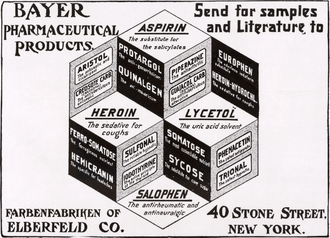Acetaminosalol

Acetaminosalol is a chemical compound that combines the properties of acetylsalicylic acid (aspirin) and phenacetin, two well-known analgesic and antipyretic agents. This compound is of historical interest in the development of pharmaceuticals aimed at relieving pain and reducing fever. Acetaminosalol was used in the late 19th and early 20th centuries as a medication for its analgesic and antipyretic effects before the widespread adoption of its parent compounds and later, more advanced medications.
Chemical Structure and Properties[edit]
Acetaminosalol is characterized by its unique chemical structure that incorporates elements of both acetylsalicylic acid and phenacetin, making it a hybrid molecule with dual action. This bifunctional nature was intended to provide a synergistic effect in pain relief and fever reduction, leveraging the mechanisms of action of both parent compounds. However, detailed chemical properties such as molecular weight, solubility, and specific chemical formula are intrinsic to its molecular design, which combines the acetyl group of acetylsalicylic acid with the phenol moiety of phenacetin.
Pharmacology[edit]
The pharmacological action of acetaminosalol is derived from its parent compounds. Acetylsalicylic acid works by inhibiting the enzyme cyclooxygenase (COX), which is involved in the synthesis of prostaglandins, substances that mediate pain and fever. Phenacetin acts primarily as an analgesic and, to a lesser extent, as an antipyretic, likely through its metabolite paracetamol (acetaminophen), which also acts on the COX enzyme but in a different manner. The combination within acetaminosalol was believed to offer a comprehensive approach to managing pain and fever, although its use has been largely superseded by safer and more effective medications.
Historical Use and Development[edit]
In the late 19th century, the search for effective analgesic and antipyretic agents led to the synthesis of acetaminosalol. Its development was part of a broader pharmaceutical innovation era that sought to combine the beneficial effects of known drugs to create more effective or safer alternatives. Despite its innovative approach, the use of acetaminosalol declined as knowledge of its parent compounds' side effects—particularly the nephrotoxicity associated with phenacetin—became more apparent. Additionally, the development of more effective and less toxic drugs, such as paracetamol, led to the obsolescence of acetaminosalol in clinical practice.
Safety and Side Effects[edit]
The safety profile of acetaminosalol reflects the concerns associated with its parent compounds. The use of phenacetin, in particular, has been linked to serious side effects, including nephrotoxicity and an increased risk of certain cancers. Acetylsalicylic acid is associated with gastrointestinal side effects and bleeding risks, particularly with long-term use. These safety concerns, coupled with the availability of safer alternatives, have rendered acetaminosalol a historical footnote in the annals of medical treatment.
Current Relevance[edit]
Today, acetaminosalol is of interest primarily to historians of medicine and pharmacology. It serves as a case study in the evolution of drug development and the importance of safety and efficacy in pharmaceutical innovation. While it is no longer used in clinical practice, the story of acetaminosalol highlights the challenges and complexities of drug development and the ongoing quest for more effective and safer medications.
Ad. Transform your life with W8MD's Budget GLP-1 injections from $75


W8MD offers a medical weight loss program to lose weight in Philadelphia. Our physician-supervised medical weight loss provides:
- Weight loss injections in NYC (generic and brand names):
- Zepbound / Mounjaro, Wegovy / Ozempic, Saxenda
- Most insurances accepted or discounted self-pay rates. We will obtain insurance prior authorizations if needed.
- Generic GLP1 weight loss injections from $75 for the starting dose.
- Also offer prescription weight loss medications including Phentermine, Qsymia, Diethylpropion, Contrave etc.
NYC weight loss doctor appointmentsNYC weight loss doctor appointments
Start your NYC weight loss journey today at our NYC medical weight loss and Philadelphia medical weight loss clinics.
- Call 718-946-5500 to lose weight in NYC or for medical weight loss in Philadelphia 215-676-2334.
- Tags:NYC medical weight loss, Philadelphia lose weight Zepbound NYC, Budget GLP1 weight loss injections, Wegovy Philadelphia, Wegovy NYC, Philadelphia medical weight loss, Brookly weight loss and Wegovy NYC
|
WikiMD's Wellness Encyclopedia |
| Let Food Be Thy Medicine Medicine Thy Food - Hippocrates |
Medical Disclaimer: WikiMD is not a substitute for professional medical advice. The information on WikiMD is provided as an information resource only, may be incorrect, outdated or misleading, and is not to be used or relied on for any diagnostic or treatment purposes. Please consult your health care provider before making any healthcare decisions or for guidance about a specific medical condition. WikiMD expressly disclaims responsibility, and shall have no liability, for any damages, loss, injury, or liability whatsoever suffered as a result of your reliance on the information contained in this site. By visiting this site you agree to the foregoing terms and conditions, which may from time to time be changed or supplemented by WikiMD. If you do not agree to the foregoing terms and conditions, you should not enter or use this site. See full disclaimer.
Credits:Most images are courtesy of Wikimedia commons, and templates, categories Wikipedia, licensed under CC BY SA or similar.
Translate this page: - East Asian
中文,
日本,
한국어,
South Asian
हिन्दी,
தமிழ்,
తెలుగు,
Urdu,
ಕನ್ನಡ,
Southeast Asian
Indonesian,
Vietnamese,
Thai,
မြန်မာဘာသာ,
বাংলা
European
español,
Deutsch,
français,
Greek,
português do Brasil,
polski,
română,
русский,
Nederlands,
norsk,
svenska,
suomi,
Italian
Middle Eastern & African
عربى,
Turkish,
Persian,
Hebrew,
Afrikaans,
isiZulu,
Kiswahili,
Other
Bulgarian,
Hungarian,
Czech,
Swedish,
മലയാളം,
मराठी,
ਪੰਜਾਬੀ,
ગુજરાતી,
Portuguese,
Ukrainian
